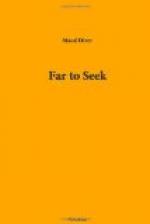Graceless ingratitude—that ‘only.’ For now, looking back, he clearly saw how the beauty and bewilderment of that early phase—so mysteriously blending Aruna with herself—had held his emotions in cheek, lifted them, purified them; had saved him, for all he knew, from surrender to an overwhelming passion that might conceivably have swept everything before it. Pure fantasy—perhaps. But he felt no inclination to argue out the unarguable. He preferred simply unquestioningly to believe that, under God, he owed his salvation to her. And after all—take it spiritually or psychologically—that was in effect the truth....
Towards morning, utter weariness lulled him into a troubled sleep—not for long. He awoke, chilled and heavy-eyed, to find the unheeded loveliness of a lemon-yellow dawn stealing over the blank immensity of earth and sky.
In a moment he was up, stretching cramped limbs, thanking goodness for a carriage to himself, leaning out and drinking huge draughts of crisp clean air, fragrant with the ghost of a whiff of wood smoke—the inimitable air of a Punjab autumn morning.
CHAPTER X.
“The tongue is a little member, and boasteth great things....
The tongue can no man
tame; it is an unruly evil, full of deadly
poison.”—ST
JAMES iii 5-8.
Roy spent ten days in Delhi—lodging with one Krishna Lal, a jewel merchant of high standing, well known to Sir Lakshman—and never a word or a sight of Dyan Singh. The need for constant precautions hampered him not a little; but if the needle he sought was in this particular haystack, he would find it yet.
Meanwhile, at every turn he was imbibing first impressions, a sufficiently enthralling occupation—in Delhi, of all places on earth: Delhi, mistress of many victors; very woman, in that she yields to conquer; and after centuries of romance and tragedy, remains, in essence, unconquered still. The old saying, ’Who holds Delhi, holds India,’ has its dark counterpart in the unwritten belief that no alien ruler, enthroned at Delhi, shall endure. Hence the dismay of many loyal Indians when the British Government deserted Calcutta for the Queen of the North. And here, already, were her endless, secretive byways rivalling Calcutta suburbs as hornet-nests of sedition and intrigue.
Roy was to grow painfully familiar with these before his search ended. But the city’s pandemonium of composite noises and composite smells was offset by the splendid remnants of Imperial Delhi:—the Pearl Mosque, a dream in marble, dazzling against the blue: inlaid columns of the Dewan-i-Khas—every leaf wrought in jade or malachite, every petal a precious stone; swelling domes and rose-pink minarets of the Jumna Musjid rising superbly from a network of narrow streets and shabby toppling houses. For, in India, the sordid and stately rub shoulders with sublime disregard for effect. In the cool aloofness of tombs and temples, or among crumbling fragments of them on the plain, or away beyond the battered Kashmir Gate—ground sacred to heroic memories—he could wander at will for hours, isolated in body and spirit, yet strangely content....




